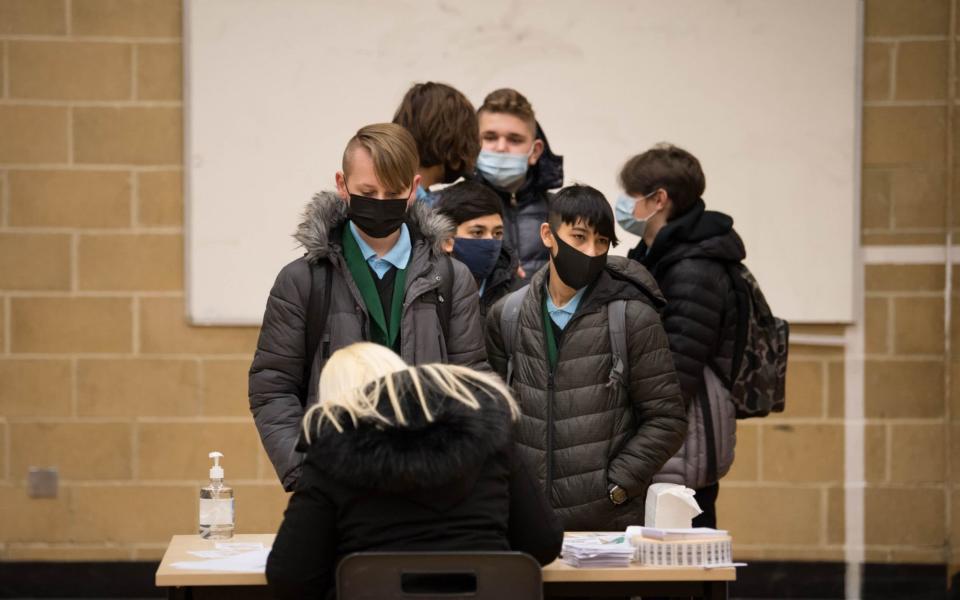Mass Covid testing in schools costing £120,000 for every positive case found


Mass testing in schools is costing up to £120,000 to find just one positive case, experts claimed as they called for the programme to be halted.
Between March 11 and March 17, data from secondary schools showed that just 1,805 positive cases were found from 3.8 million tests.
Under current false positive rates, around 1,160 of those positives would be wrong, meaning only 645 would be correct – approximately one in 6,000.
"At £20 a test, that is £120,000 per case found," said Prof Jon Deeks, head of the biostatistics, evidence synthesis and test evaluation research group at the University of Birmingham.
"There is obviously a lot of uncertainty in this, and I don't think this includes all costs, and obviously they will have varied. But even if it is only £10 per test, we are talking £60,000, which is an inefficient cost to detect a single case."
The investigation by the British Medical Journal (BMJ) also found that mass testing in universities is haphazard, with an "outrageous" price tag.
The BMJ sent Freedom of Information requests to the 216 universities and colleges eligible to receive public funding for twice-weekly lateral flow testing for students, asking how much they received, how many tests they had carried out and how many positive tests came back.
Only 16 institutions disclosed complete data on their funding, the number of tests carried out and the number of positive results. These showed that the Government spent roughly £3,000 per positive test result yielded.
But experts said this is likely to be a vast underestimation of the full cost, as factors such as staffing of testing sites were not included.
Allyson Pollock, professor of public health at Newcastle University, urged universities to abandon asymptomatic testing and instead focus on testing those with symptoms, particularly as students return to campuses and prevalence of Covid is falling to low levels.
"The clear message from the data is that the mass testing is haphazard, fragmented, disjointed and absolutely the antithesis of public health," she said. "The Government should stop all mass testing until it has been evaluated and ask the UK national screening committee to oversee it.
"It's a disgrace that the chief medical officer and chief scientist have not opposed this piecemeal and expensive approach to mass testing. They should have required proper scientific evaluations of these interventions in advance of any proposed rollout. Mass testing is likely to lead to a lot of harms now that prevalence has fallen very low."
Angela Raffle, a consultant in public health and honorary senior lecturer at Bristol University, described the rollout of asymptomatic testing as a "desperate exercise" that aimed "to change the culture in this country so that we start to think that regular tests for everybody is a worthwhile use of public resources, which it isn't".
The Government is intent on rolling out more mass testing as society reopens, with businesses invited to apply for lateral flow devices to monitor staff. However, last week a Cochrane review of 64 studies warned that asymptomatic testing only picked up around 50 per cent of cases and found far more false than real positives when infection rates were low in the community.
False results from lateral flow Covid tests may mean workplaces and schools will be needlessly forced to close even though the scheme was set up to keep them open, experts cautioned.
The group concluded that mass testing policies had been implemented "without any supporting real-world evidence".
The Government said it was up to universities to determine their testing approach, but said it was committed to working with them to offer twice weekly asymptomatic testing to all students on campus.
A Government spokesman said: "Protecting communities and saving lives is always our first priority, and every pound spent is contributing towards our efforts to keep people safe. Testing at universities is a key pillar in reducing transmission risks, and allowing more students to return to face-to-face study as safely as possible."
A spokesman for Universities UK said: "Lateral flow device testing is not perfect – no test is. But they are easy to use and give rapid results, which can enable universities to quickly identify highly infectious asymptomatic individuals who could otherwise unknowingly be spreading the virus, and help them to follow the right course of action."

 Yahoo News
Yahoo News 